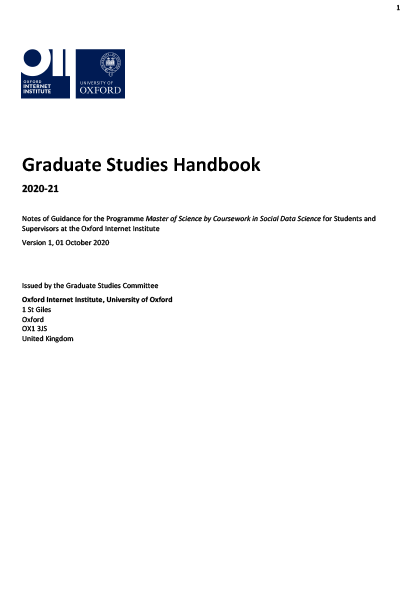Duration:
- Full-time: 10 months
Start date:
- October 2025
Deadlines:
12 noon UK time (midday) on:
- Friday 15 November 2024
- Thursday 9 January 2025
The multi-disciplinary MSc in Social Data Science equips students with applied expertise in rapidly advancing domains in machine learning coupled with theories, practices, and research focus from the social sciences.
With the rapid expansion of big data and artificial intelligence (AI) in society there is a need both to understand how to best make use of these tools and approaches, as well as to consider their social implications from a practical and grounded perspective. These new approaches can provide new perspectives on classic questions in political science, law, or sociology. At the same time, the technologies behind these approaches are rapidly posing new questions of their own regarding identity, ethics, privacy, relationships, human rights, commerce, and health, with importance for societies, regulatory bodies, and states.
During this degree, students will collect, combine, and interrogate social and behavioural data from a variety of social science perspectives with an emphasis on quantitative and computational skills alongside best practices in scientific inquiry and ethical research.
Students will join a cohesive cohort and will be expected to dedicate around 40 hours to this course each week during term, and to undertake further study and complete assessments during termly vacation periods. During Michaelmas and Hilary Terms, this equates to roughly 10 and 15 hours each week for each course taken.
Social Data Science students take five compulsory foundation papers, a data science intensive with three modules, and two options papers. Students finish by submitting a thesis of up to 15,000 words on topic chosen by the student in consultation with their thesis supervisor.
The programme combines traditional lectures with computer lab sessions and hands-on mathematics and programming exercises.
Upon completion of the MSc in Social Data Science will have:
All applications must be made through the University of Oxford Graduate Admissions site. There are two deadlines for the MSc Programme in November and January. Applications submitted for both deadlines are given equal consideration.
Please ensure that you start the online application process as early as you can, to ensure plenty of time to complete your application. Only applications that are complete by the deadline (including letters of reference) can be considered by the admissions team.
For MSc applicants interested in continuing on to doctoral study, please note that a separate application form to the combined MSc + DPhil (1+3) admissions route is no longer required. To be considered for MSc + DPhil (1+3) funding, applicants should apply to the MSc in Social Data Science only and submit an ESRC Grand Union Doctoral Training Partnership application as part of their other application materials.
This course can also be studied as a part of the Oxford 1+1 MBA programme. The Oxford 1+1 MBA programme is a unique, two-year graduate experience that combines the depth of a specialised, one-year master’s degree with the breadth of a top-ranking, one-year MBA.
The Oxford Internet Institute is participating in the University of Oxford’s pilot on selection procedures which aims to explore actions aimed at better contextualising admissions procedures for graduate students while minimising conscious and unconscious bias. For all our courses, the socio-economic data you provide in the application form will be used to contextualise the shortlisting and decision-making processes with a focus on providing opportunities for excellent students regardless of socioeconomic background. For details about the pilot and the actions we are taking, please see the University’s page on the Pilot selection procedure.
12 noon UK time (midday) on:

Associate Professor
Mohsen is the Programme Director of the MSc course.

MSc Coordinator
David is the MSc Coordinator, and administrates the course.

Our induction programme is usually held in the first week of October, the week preceding the start of Michaelmas Term (also referred to as 0th week). During Induction Week students will be formally introduced to the OII’s Director, Director of Graduate Studies, Programme Directors, Graduate Studies Support team, as well as our faculty and administrative team. In addition students will be offered a full tour of the OII’s facilities and introduced to IT and library resources, followed by several informative MSc induction sessions. There is also ample opportunity to get to know fellow students and staff through student-led social activities and an afternoon drinks reception.
Professional engagement
Over the course of the year the OII generally has a full schedule of lectures which students are welcome to attend, both in person and virtually. These range from formal departmental lectures, bespoke lectures from academic visitors, and Industry Insights lectures featuring discussions about life at a variety of technology-focused organisations, corporations, NGOs, and government departments.
Our MSc students are provided with working space in the department in both the dedicated MSc room at 1 St Giles and additional student working space at 41 St Giles. Students in the MSc program have access to departmental server provisions with both CPU and GPU capabilities as well as opportunities for access to Oxford’s high performance computing resources via Advanced Research Computing (ARC). All students are provided with Office365 and can request additional software provisions such as Overleaf, based on needs. The MSc room is adjacent to the OII’s library, specialising in social sciences, technology and computing. Students also have digital and physical access to the Bodleian Libraries, the University’s main research library.
In addition to the pastoral support provided your college, as a department the OII seeks to support students by various means. Each degree programme has dedicated administrative support and the administrators in question will be able to help and advise students on a range of matters relating to their studies, or point them towards dedicated sources of support elsewhere in the University. Supervisors and the Director of Graduate Studies can also serve as a source of support, in addition to our dedicated disability lead and several Harassment Officers who can assist with connecting students with the appropriate support.
Social Data Science students take five compulsory foundation courses, three compulsory intensive courses, and two options courses, in addition to their thesis.
Please note that the course offering listed below is provisional, and may be subject to change.
Social Data Science students take five compulsory foundation courses, designed to provide students with core skills, methods, theories and concepts required to undertake the remainder of the degree. These include laboratory and practical exercises to ensure that students are competent with particular techniques and able to use statistical and other software packages.
The data science intensive is a series of three course modules taught one after the other in Michaelmas term. The first course, Fundamentals of Social Data Science, is a primer on data science fundamentals in Python, with an emphasis on wrangling, API access, and exploratory data analysis. The second course, Data Analytics at Scale, introduces concepts for efficiency, computability, scalability, and using data on the server. The third course, Introduction to Machine Learning, introduces the basics of classification, neural networks, and various approaches to supervision and learning.
These courses are assessed by a single take home exam which runs from exploratory data analysis to simple predictive models.
Each student will select two option courses. The following list is representative, but may be updated.
A thesis of approximately 10,000 words (with a maximum of 15,000 words) is the capstone to the MSc experience. It provides students with the opportunity to apply the methods and approaches they have covered in the other parts of the course and carry out a substantive piece of academic research on a specialist topic of their choosing.
Academics within the Social Data Science programme will put forward both specific projects as well as general themes in which they would be happy to supervise theses. Students are also encouraged to propose projects of their own. Students will not be required to choose thesis topics until the second term in order to give them ample time for their research interests to develop and the opportunity to discuss topics with relevant faculty members.
2023
| Michaelmas Term | Hilary Term | Trinity Term |
|---|---|---|
|
|
Details of fees, living expenses, and definitions of home and overseas students, together with information about potential sources of funding are available from the University’s Fees and Funding website.
There are a number of sources of funding for postgraduate students at Oxford. Details of all scholarships for which candidates may be eligible can be found on the University’s Fees and Funding website. The scholarships are all highly competitive and are awarded on academic merit.
Clarendon is one of the biggest of the University’s scholarship schemes, offering around 170 new scholarships each year to academically outstanding graduates. Clarendon scholarships are competitive, prestigious and highly sought-after. As well as providing for fees and living costs Clarendon aims to enhance the Oxford experience by offering students the chance to form lasting social, academic and professional networks. Students can apply by completing the funding sections of the graduate admissions form. As part of the admissions process, the Oxford Internet Institute Scholarship Committee will decide which applicants to nominate to the University for consideration. Further details of this scholarship can be found on the University’s Clarendon Scholarships page.
The Grand Union DTP ESRC studentship is for MSc applicants who wish to continue on to doctoral study at the OII, or for applicants to the DPhil programme only.
The ESRC is the UK’s largest organisation for funding research on social and economic issues. The University, in collaboration with Brunel University and the Open University, hosts the Grand Union Doctoral Training Partnership – one of fourteen Doctoral Training Partnerships accredited by the ESRC as part of a Doctoral Training Network.
The Oxford Internet Institute’s graduate degree programmes are a recognised doctoral training pathway in the partnership and our Digital Social Science pathway is provided through two routes, Masters-to-DPhil (known as 1+3) and DPhil-only (known as +3), and is available to students studying part-time as well as those studying full-time.
In order to be considered for 1+3 funding via the Grand Union DTP ESRC studentship, you must apply to an OII MSc programme and select ‘ESRC Grand Union DTP Studentships in Social Sciences’ in the University of Oxford scholarships section of the University’s graduate application form. You must also complete a Grand Union DTP Application Form and upload it, together with your graduate application form, to be considered for nomination for the studentship.
Information about ESRC studentships at Oxford can be found on the Grand Union DTP website. Please ensure you have read all of the guidance available on the website before completing the Grand Union DTP Application Form. Questions can be directed to the Grand Union DTP Office.
ESRC studentships are open to both Home (UK) and International candidates, read more about the eligibility criteria here.
Black Academic Futures
The Black Academic Futures Scholarships offer up to 30 scholarships for UK Black and Mixed-Black students to pursue graduate study at Oxford. Applicants need to apply to an Oxford department by the January programme deadline to be considered for the scholarship and ensure they include the ethnicity information in their application.
The OII welcomes a number of Rhodes and Marshall Scholars onto the MSc programme every year. Eligible students should apply for those scholarships before applying for a place on the MSc programme.
Refugee Academic Futures
The Refugee Academic Futures scheme offers financial support to pursue graduate study at Oxford to students who are refugees or other people with lived experience of displacement. Applicants need to apply to an Oxford department by the January programme deadline to be considered for the scholarship.
Care-Experienced Academic Futures
The Care-Experienced Academic Futures scholarships offer financial support to students who have experienced being in care in the UK to pursue graduate study at Oxford.
Weidenfeld-Hoffmann Scholarships and Leadership Programme
The Weidenfeld-Hoffmann Scholarships and Leadership Programme provides the opportunity to pursue fully-funded graduate studies at the University of Oxford, combined with a comprehensive programme of leadership development, long-term mentoring and networking.
To be considered for this scholarship, you must select the Weidenfeld-Hoffmann Scholarships and Leadership Programme in the University of Oxford Scholarships section of the University’s graduate application form and submit your application for graduate study by the January deadline for your course.
The OII awards a limited number of MSc Scholarships each academic year. These scholarships are open to students (from any country) and all applicants who are offered a place on our programme are automatically considered for an award. Scholarships are awarded on the basis of merit.
Recipients of an OII departmental scholarship will be designated as Shirley Scholars, and they will be supported by the Shirley Scholars Fund established in honour of OII founder donor Dame Stephanie Shirley.
Download the handbook for study in the academic year 2024-2025

You can find general FAQs about applying to our courses, studying at the OII, and choosing a college on the study FAQs page.
The MSc in Social Data Science is designed for students with core quantitative skills who wish to develop their skills for analysing structured and unstructured data using advanced computational techniques such as machine learning. Theses in Social Data Science might develop new computational approaches for analysing human behavioural data and/or apply such approaches to answer a social science question. The MSc in Social Science of the Internet is designed for students interested in research about the Internet and related technologies and their societal implications. Theses in this programme might include quantitative, qualitative, computational or mixed methods applied to a broad range of questions about digital phenomena and could address questions about technology policy or practice.
A substantial amount of training in our programmes happens at the MSc level. It is therefore expected that applicants to DPhil programmes already hold a taught masters or other advanced degree. For Social Data Science, applicants should examine the MSc Social Data Science courses and are advised to apply for the MSc if their current experience covers less than half of the content taught within the MSc Social Data Science programme. DPhil students will work with their supervisors and the course director to identify any further areas of specialised training that is needed for their theses and opportunities to meet these needs from across the University. DPhil students will usually take the Foundation courses from the MSc Social Data Science unless they already have equivalent training.
There are two deadlines for the MSc Programme. Applications submitted in each deadline are given equal consideration, so please choose the deadline that works best for you. Please ensure that you start the online application process as early as you can, to ensure plenty of time to complete your application. Only applications that are complete by the deadline can be considered by the admissions team. All applications must be made through the University of Oxford Graduate Admissions site.
You can read more about the English language requirements for graduate study applications in the graduate application guide. This course requires proficiency in English at the University’s higher level. If you already have English language test scores at the required level achieved within two years of the start of the course to which you are applying, please include them in your application. However, you are not required to provide test scores when you submit your application.
Our students are supervised by OII faculty members and colleagues in partner departments.
Students are assigned a general supervisor in the first term of their studies. The general supervisor can answer questions and help the student navigate the department. Students will be surveyed on their research interests during the first term and then in the second term students are assigned a thesis supervisor with more direct topical or research experience for the student’s chosen thesis project. The department provide resources to help students discover faculty and propose a suitable thesis supervisor. This may include a booklet of thesis topics or a social event to introduce faculty.
Course fees cover your teaching, and other academic services and facilities provided to support your studies. They do not cover your accommodation or other living costs.
See the University’s guidance on fee status and fee liability for information on Home/Republic of Ireland, Islands and Overseas student classification. As well as covering University and College fees, students will also have to support their maintenance costs. As Oxford is a relatively expensive place to live, it is recommended that students consult the University’s guidance on living costs when planning their budget, to cover accommodation, meals and other living expenses.
Full-time students are required by the University’s regulations to be in residence in Oxford for each of the 8 weeks of Michaelmas, Hilary and Trinity terms. You will be free to leave Oxford after the end of each term but are advised to return during the week prior to the start of the next term (referred to as 0th week).
We do not currently offer any of our MSc or DPhil programmes online, and the MSc in Social Data Science is only offered in a full-time mode due to the intensive nature of several of the core courses. The DPhil in Social Data Science is offered in both full-time and part-time modes, and our MSc in Social Science of the Internet is offered part-time.